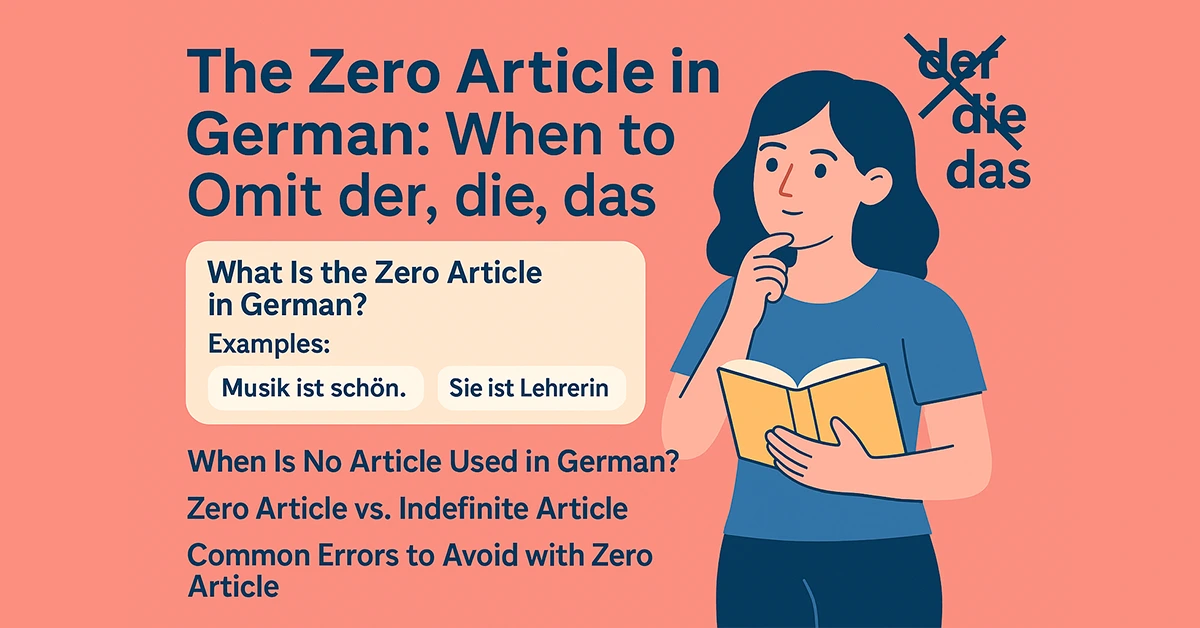The Zero Article in German: When to Omit der, die, das

Learn when no article is used in German. This guide explains the rules of the zero article with examples and typical situations.
What Is the Zero Article in German?
In German, the “zero article” refers to situations where no article is used before a noun. Unlike English, German uses articles frequently, so learning when to omit them is essential for fluency.
Why Does German Sometimes Omit the Article?
The absence of an article in German often conveys generality, categorization, or abstractness. It’s not random — specific grammar rules govern it.
The Role of Zero Article in German Grammar
Zero article usage is part of German grammar’s case and noun system. It usually appears with plural or uncountable nouns when referring to things in general.
Noun Types Commonly Used Without Articles
- Plural nouns (e.g., “Hunde sind treu.”)
- Mass nouns (e.g., “Milch ist gesund.”)
- Professions and nationalities (e.g., “Er ist Lehrer.”)
Zero Article with Plural Nouns
Plural nouns in general statements usually omit the article:
Example: “Autos sind teuer.” (Cars are expensive.)
Zero Article with Mass Nouns
Uncountable nouns like water, milk, or rice often appear without articles:
Example: “Zucker ist süß.” (Sugar is sweet.)
Professions and Nationalities Without an Article
When describing someone’s job or nationality, articles are usually omitted:
Example: “Sie ist Ärztin.” (She is a doctor.)
Zero Article with Meals and Times of Day
Meals and time expressions often drop the article in idiomatic usage:
Example: “Wir essen Frühstück um acht.” (We eat breakfast at eight.)
Using Zero Article with Days and Seasons
Days of the week and seasons don’t take an article in certain expressions:
Example: “Montag ist frei.” (Monday is free.)
Zero Article with Names of Languages and Subjects
Academic subjects and languages omit articles when used generally:
Example: “Ich lerne Deutsch.” (I am learning German.)
Set Phrases and Idioms with Zero Article
- zu Hause (at home)
- mit Freude (with joy)
- ohne Zweifel (without a doubt)
When Not to Use the Zero Article
You should avoid dropping the article when specificity or countability is intended:
Example: “Ich habe einen Hund.” (I have a dog.) – Here, an article is required.
Zero Article vs. Indefinite Article
Zero article is for general, indefinite mass or plural nouns. Indefinite article (“ein/eine”) is used for singular countable nouns:
Example: “Ich trinke Wasser.” vs. “Ich trinke ein Bier.”
Zero Article vs. Definite Article
Compare general vs. specific meaning:
Example: “Musik ist schön.” vs. “Die Musik war laut.”
Key Prepositions That Trigger Zero Article
- mit – “mit Freude” (with joy)
- ohne – “ohne Zweifel” (without doubt)
- zu – “zu Hause” (at home)
Common Mistakes with Zero Article
- Using “ein” with plural nouns
- Forgetting articles with countable singulars
- Translating literally from English
Real-Life Examples of Zero Article in Use
German is full of zero article structures. Here are a few:
- “Kinder spielen draußen.” (Children are playing outside.)
- “Brot ist frisch.” (Bread is fresh.)
- “Sommer ist heiß.” (Summer is hot.)
Mini Quiz: Choose the Correct Article (or None)
Which of these sentences correctly omits the article?
- a) Ich trinke Kaffee.
- b) Ich trinke ein Kaffee.
Answer: a) is correct. “Kaffee” is used as a mass noun here.
Tips for Mastering the Zero Article in German
- Practice with real examples
- Pay attention to plural and mass noun rules
- Notice idiomatic expressions without articles
Frequently Asked Questions About Zero Article
When should I not use any article in German?
When talking about plural or uncountable nouns in general, or with specific expressions and prepositions.
Can singular nouns appear without an article?
Yes, especially in expressions about profession or nationality (e.g., “Er ist Arzt.”).
Is the zero article common in spoken German?
Yes. It’s frequently used in both written and spoken language, especially in general statements.
Conclusion: When and How to Use Zero Article Properly
The zero article is a subtle but powerful part of German grammar. Focus on plural and uncountable nouns, idiomatic expressions, and grammar patterns. With practice, you’ll learn to drop the article confidently when needed.